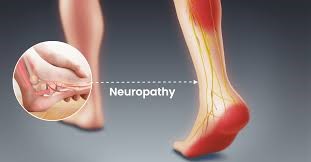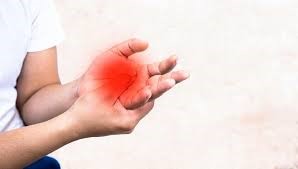Neuropathy Treatment in Navi Mumbai
Neuropathy refers to nerve damage, often causing numbness, tingling, pain, and muscle weakness. It can result from diabetes, infections, injuries, or other medical conditions. Treatment focuses on managing symptoms and addressing the underlying cause. Early diagnosis is crucial for preventing further nerve damage and improving quality of life.
Neuropathy treatment in Navi Mumbai at Dr Girish Nair, employs advanced diagnostic tools and personalized care plans. His management for neuropathic conditions is comprehensive due to the use of such tools as well as a high degree of personal commitment. This means that the treatment provided here is not only for relieving pain but also for improving function. So that a patient regains most normal functioning possible while living a fulfilling life at the same time given that it is all-embracing in terms of a composite approach involving diverse techniques together with the use of ultimate but scientifically proven methods.

Peripheral Neuropathy Treatment in Navi Mumbai
Peripheral neuropathy is a condition resulting from damage to the peripheral nerves, causing weakness, numbness, and pain, typically in the hands and feet. It can result from diabetes, infections, injuries, and exposure to toxins. Symptoms vary but often include tingling, burning sensations, and muscle weakness. Treatment focuses on managing the underlying cause and relieving symptoms.
Peripheral neuropathy treatment at Dr. Girish Nair's clinic in Navi Mumbai. By calling on advanced methods with an individualized touch, Dr. Nair together with his group of doctors gives holistic care that eases symptoms and restores standard of living. Comprehensive management is guaranteed because they focus on general health of patients aiming at complete healing as well as continued rehabilitation which are suited for each one is important at this facility.

Treatment for Neuropathy in Leg & Feet
- Medications: Prescribed medications for neuropathic pain typically include drugs such as gabapentin or pregabalin, which work by altering the way nerves communicate pain signals. These medications help alleviate discomfort and improve quality of life for individuals suffering from neuropathy.
- Physical Therapy: Physical therapy for neuropathy often involves a combination of exercises and stretches aimed at improving strength, mobility, and balance. These targeted interventions can help alleviate symptoms, enhance functional abilities, and promote overall well-being in individuals with neuropathic conditions.
- Transcutaneous Electrical Nerve Stimulation (TENS): Transcutaneous electrical nerve stimulation (TENS) is a therapy that utilizes low-voltage electrical currents to alleviate pain by interfering with pain signals sent to the brain. This non-invasive approach is commonly used to provide relief from neuropathic pain and can be administered at home with portable devices under medical guidance.
- Lifestyle Modifications: Lifestyle modifications for managing neuropathy often incorporate dietary adjustments, emphasizing nutrient-rich foods and minimizing processed sugars and saturated fats. Regular exercise, such as walking or swimming, helps improve circulation and nerve function, while avoiding alcohol and tobacco can help mitigate further nerve damage and improve overall health outcomes.
- Supportive Devices: Supportive devices like orthopedic shoes or braces are designed to alleviate discomfort and reduce pressure on the feet, which is particularly beneficial for individuals with neuropathy-related foot pain. These devices can improve stability, mobility, and overall comfort, contributing to better quality of life for those managing neuropathic symptoms.
- Alternative Therapies: Alternative therapies like acupuncture or massage therapy may be considered as complementary treatments under medical guidance for neuropathy management. While their effectiveness varies from person to person, some individuals find relief from neuropathic symptoms through these modalities, often in conjunction with conventional medical interventions.
Therapy for Neuropathy
Here are some therapeutic approaches commonly used:
- Occupational Therapy: Occupational therapists can suggest adaptations to daily activities to minimize nerve irritation and maximize function. They may recommend ergonomic modifications, assistive devices, or techniques to reduce strain on nerves.
- Biofeedback: Biofeedback techniques can teach patients how to control physiological processes, such as heart rate or muscle tension, to manage neuropathic symptoms like pain or stress.
- Cognitive-Behavioral Therapy (CBT): CBT helps individuals reframe negative thought patterns and develop coping strategies to better manage the emotional impact of living with neuropathy.
- Massage Therapy: Massage can promote relaxation, improve circulation, and reduce muscle tension, potentially providing relief from neuropathic pain and discomfort.
- Acupuncture: Acupuncture involves inserting thin needles into specific points on the body to alleviate pain and promote healing. Some people find it helpful for managing neuropathy symptoms.
- Medication Management: While not strictly a form of therapy, medications such as anticonvulsants, antidepressants, or topical treatments may be prescribed to help manage neuropathic pain.
- Nutritional Therapy: A balanced diet rich in vitamins, minerals, and antioxidants can support nerve health and may help alleviate neuropathy symptoms. Some supplements, such as alpha-lipoic acid or B vitamins, may also be beneficial.
- Mindfulness and Relaxation Techniques: Practices like meditation, deep breathing exercises, or progressive muscle relaxation can help reduce stress, improve sleep quality, and lessen the perception of neuropathic pain.
Types of Neuropathy
Neuropathy refers to conditions that affect the nerves, resulting in symptoms like pain, numbness, tingling, and weakness. There are several types of neuropathy, including:
- Peripheral Neuropathy: This is the most common type, affecting the nerves outside the brain and spinal cord. It often causes numbness, tingling, and pain, usually in the hands and feet.
- Diabetic Neuropathy: People with diabetes may develop this type of neuropathy due to high blood sugar levels damaging the nerves over time. It can affect various parts of the body and may lead to serious complications if not managed properly.
- Autonomic Neuropathy: This type affects the nerves that control involuntary bodily functions such as heart rate, digestion, and bladder function. Symptoms may include dizziness, digestive issues, and problems with blood pressure regulation.
- Focal Neuropathy: Also known as mononeuropathy, this type affects a single nerve or group of nerves, causing sudden weakness or pain in a specific area of the body.
- Hereditary Neuropathy: These are inherited disorders that affect the nerves, such as Charcot-Marie-Tooth disease. Symptoms may vary widely depending on the specific genetic mutation involved.
- Idiopathic Neuropathy: In some cases, the cause of neuropathy is unknown, leading to idiopathic neuropathy. It can be challenging to diagnose and treat due to the lack of a clear underlying cause.
- Toxic Neuropathy: Exposure to certain toxins, such as heavy metals or chemicals, can damage the nerves and lead to neuropathy. Examples include lead poisoning or chemotherapy-induced neuropathy.
- Compression Neuropathy: Nerves can become compressed or pinched due to factors like repetitive motion, injury, or anatomical abnormalities. Carpal tunnel syndrome is a common example of compression neuropathy.
- Inflammatory Neuropathy: Conditions like Guillain-Barré syndrome or chronic inflammatory demyelinating polyneuropathy (CIDP) involve inflammation of the nerves, leading to symptoms like weakness and tingling.
- Alcoholic Neuropathy: Chronic alcohol abuse can damage nerves, resulting in symptoms such as numbness, tingling, and muscle weakness, particularly in the extremities.
Causes:
Poorly Managed Diabetes: The most common type of neuropathy is diabetic peripheral neuropathy, which affects people managing diabetes with poorly controlled blood sugar.
HIV/AIDS: About 2 percent of total neuropathy cases are attributed to HIV/AIDs, which can be due to the effects of the human immunodeficiency virus or the drugs used to treat it.
Idiopathic Neuropathy: The second-largest group of neuropathy sufferers are those for which no cause has been identified — 23 percent — and therefore their condition is known as idiopathic peripheral neuropathy.
Symptoms:
Temporary or permanent numbness.
Impairment to urination and sexual function.
Muscle weakness or wasting.
Increased sensitivity to touch.
Dysfunction in organs or glands.
Pain And Paralysis.
Frequently Asked Questions
Neuropathy can affect anyone, but people with diabetes, vitamin deficiencies, autoimmune disorders, chronic alcohol use, or a family history of nerve problems are at higher risk. Age and certain medications can also increase the likelihood of nerve damage.
Neuropathy can make everyday activities challenging. Symptoms like numbness, tingling, or burning pain in the hands and feet can affect walking, balance, and coordination. Early treatment can help maintain mobility and independence.
Yes. Maintaining a healthy diet, exercising regularly, avoiding alcohol and smoking, and controlling blood sugar levels can significantly help manage neuropathy symptoms. Small daily habits can prevent nerve damage from worsening.
Yes, several medications can help manage nerve pain, including pain relievers, anti-seizure drugs, and certain antidepressants. Your doctor may combine these with physical therapy and lifestyle changes for better results.
You should consult a doctor if you notice persistent tingling, numbness, burning sensations, or weakness in your hands or feet. Early diagnosis and treatment are crucial to prevent further nerve damage and improve quality of life.
